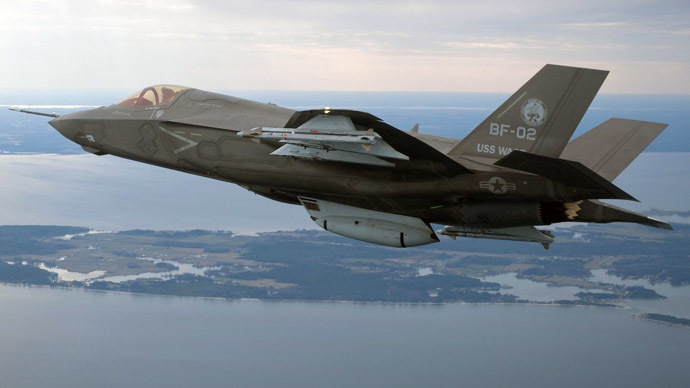New Chinese stealth jet built with stolen F-35 component designs

A new Chinese stealth fighter jet’s design includes details obtained in a Chinese cyber-spying operation conducted seven years ago against the F-35 Lightning II, according to a new report based on conversations with US military officials and contractors.
The Chinese espionage plot, dubbed Operation Byzantine Hades by US intelligence agencies, primarily targeted government as well as US industry. While the US Office of National Intelligence is known to have more details about the plot, Bill Gertz of the Washington Free Beacon reported that new Chinese planes have incorporated technology previously only found in the F-35.
A video posted on a Chinese military message board was reportedly the first evidence that such a theft had taken place. The websites featured images of a newer version of the J-20 stealth jet, a twin engine aircraft currently under development by the Chinese People Liberation’s Army.
The initial J-20 prototype was revealed in 2011, however the aircraft shown in the video was equipped with a new electro-optical targeting system under its nose, an updated coating that will help the plane hide from radar, and newly hidden engine nozzle, according to the Free Beacon.
Pentagon officials have said that the data was first taken by a Chinese military group called the Technical Reconnaissance Bureau based in Chengdu province. The information was then given to the Aviation Industry Corp. (AVIC). The AVIC then passed it on to a subsidiary, the Chengdu Aircraft Industry Group, to incorporate the information into the new design.
The US military first began development on the F-35 in 2006. Since then, the stealth fighter has a reported 100 percent success rate in its weapons testing in recent years, according to Michael Brissenden of ABC news in Australia, although reliability issues with the plane mean its design is not yet complete.

The F-35 was designed to carry out ground attacks and air missions, with advanced sensors attached to make up for any maneuvering vulnerabilities. Richard Fisher, a specialist on Chinese weapon systems, told the Free Beacon that technology installed under the J-20’s nose is remarkably similar to the F-35’s sensors.
“This targeting system and a set of distributed high-power infrared sensors give the F-35 a previously unrivaled ‘situational awareness,’ but now it is clear that the J-20 will have a similar targeting system and its own set of distributed sensors,” he said.
“If as part of their espionage, China had also gained engineering insights into the F-35’s very advanced sensor systems, that could prove disastrous to its combat potential barring a rapid redesign and improvements before entering service.”
Last year US officials denied that the Chinese had gained an edge on American military capabilities, although they did not refute that cyber-espionage is becoming more common in the tense world of geopolitics.
“The viciousness, and just the volume of attacks, not only by the Chinese but Russians and others trying to get the blueprints of our most sensitive material is just breathtaking – and they’re getting better,” Rep. Mike Rogers, chairman of the House Intelligence Committee, told CNN.
“It costs billions and billions of dollars extra to try to make sure that we’re staying ahead of our adversaries with technology. When they steal it, they leap ahead. That means we have to invest more, and change that technology. It is a serious problem,” he said.














